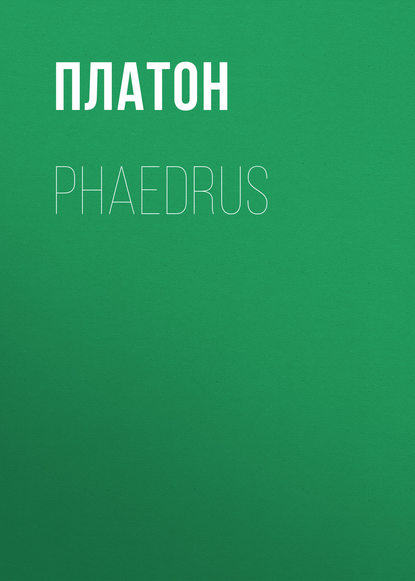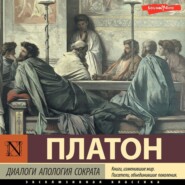По всем вопросам обращайтесь на: info@litportal.ru
(©) 2003-2024.
✖
Phaedrus
Настройки чтения
Размер шрифта
Высота строк
Поля
PHAEDRUS: Yes, they are royal men; but their art is not the same with the art of those whom you call, and rightly, in my opinion, dialecticians: – Still we are in the dark about rhetoric.
SOCRATES: What do you mean? The remains of it, if there be anything remaining which can be brought under rules of art, must be a fine thing; and, at any rate, is not to be despised by you and me. But how much is left?
PHAEDRUS: There is a great deal surely to be found in books of rhetoric?
SOCRATES: Yes; thank you for reminding me: – There is the exordium, showing how the speech should begin, if I remember rightly; that is what you mean – the niceties of the art?
PHAEDRUS: Yes.
SOCRATES: Then follows the statement of facts, and upon that witnesses; thirdly, proofs; fourthly, probabilities are to come; the great Byzantian word-maker also speaks, if I am not mistaken, of confirmation and further confirmation.
PHAEDRUS: You mean the excellent Theodorus.
SOCRATES: Yes; and he tells how refutation or further refutation is to be managed, whether in accusation or defence. I ought also to mention the illustrious Parian, Evenus, who first invented insinuations and indirect praises; and also indirect censures, which according to some he put into verse to help the memory. But shall I 'to dumb forgetfulness consign' Tisias and Gorgias, who are not ignorant that probability is superior to truth, and who by force of argument make the little appear great and the great little, disguise the new in old fashions and the old in new fashions, and have discovered forms for everything, either short or going on to infinity. I remember Prodicus laughing when I told him of this; he said that he had himself discovered the true rule of art, which was to be neither long nor short, but of a convenient length.
PHAEDRUS: Well done, Prodicus!
SOCRATES: Then there is Hippias the Elean stranger, who probably agrees with him.
PHAEDRUS: Yes.
SOCRATES: And there is also Polus, who has treasuries of diplasiology, and gnomology, and eikonology, and who teaches in them the names of which Licymnius made him a present; they were to give a polish.
PHAEDRUS: Had not Protagoras something of the same sort?
SOCRATES: Yes, rules of correct diction and many other fine precepts; for the 'sorrows of a poor old man,' or any other pathetic case, no one is better than the Chalcedonian giant; he can put a whole company of people into a passion and out of one again by his mighty magic, and is first-rate at inventing or disposing of any sort of calumny on any grounds or none. All of them agree in asserting that a speech should end in a recapitulation, though they do not all agree to use the same word.
PHAEDRUS: You mean that there should be a summing up of the arguments in order to remind the hearers of them.
SOCRATES: I have now said all that I have to say of the art of rhetoric: have you anything to add?
PHAEDRUS: Not much; nothing very important.
SOCRATES: Leave the unimportant and let us bring the really important question into the light of day, which is: What power has this art of rhetoric, and when?
PHAEDRUS: A very great power in public meetings.
SOCRATES: It has. But I should like to know whether you have the same feeling as I have about the rhetoricians? To me there seem to be a great many holes in their web.
PHAEDRUS: Give an example.
SOCRATES: I will. Suppose a person to come to your friend Eryximachus, or to his father Acumenus, and to say to him: 'I know how to apply drugs which shall have either a heating or a cooling effect, and I can give a vomit and also a purge, and all that sort of thing; and knowing all this, as I do, I claim to be a physician and to make physicians by imparting this knowledge to others,' – what do you suppose that they would say?
PHAEDRUS: They would be sure to ask him whether he knew 'to whom' he would give his medicines, and 'when,' and 'how much.'
SOCRATES: And suppose that he were to reply: 'No; I know nothing of all that; I expect the patient who consults me to be able to do these things for himself'?
PHAEDRUS: They would say in reply that he is a madman or a pedant who fancies that he is a physician because he has read something in a book, or has stumbled on a prescription or two, although he has no real understanding of the art of medicine.
SOCRATES: And suppose a person were to come to Sophocles or Euripides and say that he knows how to make a very long speech about a small matter, and a short speech about a great matter, and also a sorrowful speech, or a terrible, or threatening speech, or any other kind of speech, and in teaching this fancies that he is teaching the art of tragedy – ?
PHAEDRUS: They too would surely laugh at him if he fancies that tragedy is anything but the arranging of these elements in a manner which will be suitable to one another and to the whole.
SOCRATES: But I do not suppose that they would be rude or abusive to him: Would they not treat him as a musician a man who thinks that he is a harmonist because he knows how to pitch the highest and lowest note; happening to meet such an one he would not say to him savagely, 'Fool, you are mad!' But like a musician, in a gentle and harmonious tone of voice, he would answer: 'My good friend, he who would be a harmonist must certainly know this, and yet he may understand nothing of harmony if he has not got beyond your stage of knowledge, for you only know the preliminaries of harmony and not harmony itself.'
PHAEDRUS: Very true.
SOCRATES: And will not Sophocles say to the display of the would-be tragedian, that this is not tragedy but the preliminaries of tragedy? and will not Acumenus say the same of medicine to the would-be physician?
PHAEDRUS: Quite true.
SOCRATES: And if Adrastus the mellifluous or Pericles heard of these wonderful arts, brachylogies and eikonologies and all the hard names which we have been endeavouring to draw into the light of day, what would they say? Instead of losing temper and applying uncomplimentary epithets, as you and I have been doing, to the authors of such an imaginary art, their superior wisdom would rather censure us, as well as them. 'Have a little patience, Phaedrus and Socrates, they would say; you should not be in such a passion with those who from some want of dialectical skill are unable to define the nature of rhetoric, and consequently suppose that they have found the art in the preliminary conditions of it, and when these have been taught by them to others, fancy that the whole art of rhetoric has been taught by them; but as to using the several instruments of the art effectively, or making the composition a whole, – an application of it such as this is they regard as an easy thing which their disciples may make for themselves.'
PHAEDRUS: I quite admit, Socrates, that the art of rhetoric which these men teach and of which they write is such as you describe – there I agree with you. But I still want to know where and how the true art of rhetoric and persuasion is to be acquired.
SOCRATES: The perfection which is required of the finished orator is, or rather must be, like the perfection of anything else; partly given by nature, but may also be assisted by art. If you have the natural power and add to it knowledge and practice, you will be a distinguished speaker; if you fall short in either of these, you will be to that extent defective. But the art, as far as there is an art, of rhetoric does not lie in the direction of Lysias or Thrasymachus.
PHAEDRUS: In what direction then?
SOCRATES: I conceive Pericles to have been the most accomplished of rhetoricians.
PHAEDRUS: What of that?
SOCRATES: All the great arts require discussion and high speculation about the truths of nature; hence come loftiness of thought and completeness of execution. And this, as I conceive, was the quality which, in addition to his natural gifts, Pericles acquired from his intercourse with Anaxagoras whom he happened to know. He was thus imbued with the higher philosophy, and attained the knowledge of Mind and the negative of Mind, which were favourite themes of Anaxagoras, and applied what suited his purpose to the art of speaking.
PHAEDRUS: Explain.
SOCRATES: Rhetoric is like medicine.
PHAEDRUS: How so?
SOCRATES: Why, because medicine has to define the nature of the body and rhetoric of the soul – if we would proceed, not empirically but scientifically, in the one case to impart health and strength by giving medicine and food, in the other to implant the conviction or virtue which you desire, by the right application of words and training.
PHAEDRUS: There, Socrates, I suspect that you are right.
SOCRATES: And do you think that you can know the nature of the soul intelligently without knowing the nature of the whole?
PHAEDRUS: Hippocrates the Asclepiad says that the nature even of the body can only be understood as a whole. (Compare Charmides.)
SOCRATES: Yes, friend, and he was right: – still, we ought not to be content with the name of Hippocrates, but to examine and see whether his argument agrees with his conception of nature.
PHAEDRUS: I agree.
SOCRATES: Then consider what truth as well as Hippocrates says about this or about any other nature. Ought we not to consider first whether that which we wish to learn and to teach is a simple or multiform thing, and if simple, then to enquire what power it has of acting or being acted upon in relation to other things, and if multiform, then to number the forms; and see first in the case of one of them, and then in the case of all of them, what is that power of acting or being acted upon which makes each and all of them to be what they are?
PHAEDRUS: You may very likely be right, Socrates.
SOCRATES: The method which proceeds without analysis is like the groping of a blind man. Yet, surely, he who is an artist ought not to admit of a comparison with the blind, or deaf. The rhetorician, who teaches his pupil to speak scientifically, will particularly set forth the nature of that being to which he addresses his speeches; and this, I conceive, to be the soul.
SOCRATES: What do you mean? The remains of it, if there be anything remaining which can be brought under rules of art, must be a fine thing; and, at any rate, is not to be despised by you and me. But how much is left?
PHAEDRUS: There is a great deal surely to be found in books of rhetoric?
SOCRATES: Yes; thank you for reminding me: – There is the exordium, showing how the speech should begin, if I remember rightly; that is what you mean – the niceties of the art?
PHAEDRUS: Yes.
SOCRATES: Then follows the statement of facts, and upon that witnesses; thirdly, proofs; fourthly, probabilities are to come; the great Byzantian word-maker also speaks, if I am not mistaken, of confirmation and further confirmation.
PHAEDRUS: You mean the excellent Theodorus.
SOCRATES: Yes; and he tells how refutation or further refutation is to be managed, whether in accusation or defence. I ought also to mention the illustrious Parian, Evenus, who first invented insinuations and indirect praises; and also indirect censures, which according to some he put into verse to help the memory. But shall I 'to dumb forgetfulness consign' Tisias and Gorgias, who are not ignorant that probability is superior to truth, and who by force of argument make the little appear great and the great little, disguise the new in old fashions and the old in new fashions, and have discovered forms for everything, either short or going on to infinity. I remember Prodicus laughing when I told him of this; he said that he had himself discovered the true rule of art, which was to be neither long nor short, but of a convenient length.
PHAEDRUS: Well done, Prodicus!
SOCRATES: Then there is Hippias the Elean stranger, who probably agrees with him.
PHAEDRUS: Yes.
SOCRATES: And there is also Polus, who has treasuries of diplasiology, and gnomology, and eikonology, and who teaches in them the names of which Licymnius made him a present; they were to give a polish.
PHAEDRUS: Had not Protagoras something of the same sort?
SOCRATES: Yes, rules of correct diction and many other fine precepts; for the 'sorrows of a poor old man,' or any other pathetic case, no one is better than the Chalcedonian giant; he can put a whole company of people into a passion and out of one again by his mighty magic, and is first-rate at inventing or disposing of any sort of calumny on any grounds or none. All of them agree in asserting that a speech should end in a recapitulation, though they do not all agree to use the same word.
PHAEDRUS: You mean that there should be a summing up of the arguments in order to remind the hearers of them.
SOCRATES: I have now said all that I have to say of the art of rhetoric: have you anything to add?
PHAEDRUS: Not much; nothing very important.
SOCRATES: Leave the unimportant and let us bring the really important question into the light of day, which is: What power has this art of rhetoric, and when?
PHAEDRUS: A very great power in public meetings.
SOCRATES: It has. But I should like to know whether you have the same feeling as I have about the rhetoricians? To me there seem to be a great many holes in their web.
PHAEDRUS: Give an example.
SOCRATES: I will. Suppose a person to come to your friend Eryximachus, or to his father Acumenus, and to say to him: 'I know how to apply drugs which shall have either a heating or a cooling effect, and I can give a vomit and also a purge, and all that sort of thing; and knowing all this, as I do, I claim to be a physician and to make physicians by imparting this knowledge to others,' – what do you suppose that they would say?
PHAEDRUS: They would be sure to ask him whether he knew 'to whom' he would give his medicines, and 'when,' and 'how much.'
SOCRATES: And suppose that he were to reply: 'No; I know nothing of all that; I expect the patient who consults me to be able to do these things for himself'?
PHAEDRUS: They would say in reply that he is a madman or a pedant who fancies that he is a physician because he has read something in a book, or has stumbled on a prescription or two, although he has no real understanding of the art of medicine.
SOCRATES: And suppose a person were to come to Sophocles or Euripides and say that he knows how to make a very long speech about a small matter, and a short speech about a great matter, and also a sorrowful speech, or a terrible, or threatening speech, or any other kind of speech, and in teaching this fancies that he is teaching the art of tragedy – ?
PHAEDRUS: They too would surely laugh at him if he fancies that tragedy is anything but the arranging of these elements in a manner which will be suitable to one another and to the whole.
SOCRATES: But I do not suppose that they would be rude or abusive to him: Would they not treat him as a musician a man who thinks that he is a harmonist because he knows how to pitch the highest and lowest note; happening to meet such an one he would not say to him savagely, 'Fool, you are mad!' But like a musician, in a gentle and harmonious tone of voice, he would answer: 'My good friend, he who would be a harmonist must certainly know this, and yet he may understand nothing of harmony if he has not got beyond your stage of knowledge, for you only know the preliminaries of harmony and not harmony itself.'
PHAEDRUS: Very true.
SOCRATES: And will not Sophocles say to the display of the would-be tragedian, that this is not tragedy but the preliminaries of tragedy? and will not Acumenus say the same of medicine to the would-be physician?
PHAEDRUS: Quite true.
SOCRATES: And if Adrastus the mellifluous or Pericles heard of these wonderful arts, brachylogies and eikonologies and all the hard names which we have been endeavouring to draw into the light of day, what would they say? Instead of losing temper and applying uncomplimentary epithets, as you and I have been doing, to the authors of such an imaginary art, their superior wisdom would rather censure us, as well as them. 'Have a little patience, Phaedrus and Socrates, they would say; you should not be in such a passion with those who from some want of dialectical skill are unable to define the nature of rhetoric, and consequently suppose that they have found the art in the preliminary conditions of it, and when these have been taught by them to others, fancy that the whole art of rhetoric has been taught by them; but as to using the several instruments of the art effectively, or making the composition a whole, – an application of it such as this is they regard as an easy thing which their disciples may make for themselves.'
PHAEDRUS: I quite admit, Socrates, that the art of rhetoric which these men teach and of which they write is such as you describe – there I agree with you. But I still want to know where and how the true art of rhetoric and persuasion is to be acquired.
SOCRATES: The perfection which is required of the finished orator is, or rather must be, like the perfection of anything else; partly given by nature, but may also be assisted by art. If you have the natural power and add to it knowledge and practice, you will be a distinguished speaker; if you fall short in either of these, you will be to that extent defective. But the art, as far as there is an art, of rhetoric does not lie in the direction of Lysias or Thrasymachus.
PHAEDRUS: In what direction then?
SOCRATES: I conceive Pericles to have been the most accomplished of rhetoricians.
PHAEDRUS: What of that?
SOCRATES: All the great arts require discussion and high speculation about the truths of nature; hence come loftiness of thought and completeness of execution. And this, as I conceive, was the quality which, in addition to his natural gifts, Pericles acquired from his intercourse with Anaxagoras whom he happened to know. He was thus imbued with the higher philosophy, and attained the knowledge of Mind and the negative of Mind, which were favourite themes of Anaxagoras, and applied what suited his purpose to the art of speaking.
PHAEDRUS: Explain.
SOCRATES: Rhetoric is like medicine.
PHAEDRUS: How so?
SOCRATES: Why, because medicine has to define the nature of the body and rhetoric of the soul – if we would proceed, not empirically but scientifically, in the one case to impart health and strength by giving medicine and food, in the other to implant the conviction or virtue which you desire, by the right application of words and training.
PHAEDRUS: There, Socrates, I suspect that you are right.
SOCRATES: And do you think that you can know the nature of the soul intelligently without knowing the nature of the whole?
PHAEDRUS: Hippocrates the Asclepiad says that the nature even of the body can only be understood as a whole. (Compare Charmides.)
SOCRATES: Yes, friend, and he was right: – still, we ought not to be content with the name of Hippocrates, but to examine and see whether his argument agrees with his conception of nature.
PHAEDRUS: I agree.
SOCRATES: Then consider what truth as well as Hippocrates says about this or about any other nature. Ought we not to consider first whether that which we wish to learn and to teach is a simple or multiform thing, and if simple, then to enquire what power it has of acting or being acted upon in relation to other things, and if multiform, then to number the forms; and see first in the case of one of them, and then in the case of all of them, what is that power of acting or being acted upon which makes each and all of them to be what they are?
PHAEDRUS: You may very likely be right, Socrates.
SOCRATES: The method which proceeds without analysis is like the groping of a blind man. Yet, surely, he who is an artist ought not to admit of a comparison with the blind, or deaf. The rhetorician, who teaches his pupil to speak scientifically, will particularly set forth the nature of that being to which he addresses his speeches; and this, I conceive, to be the soul.

















